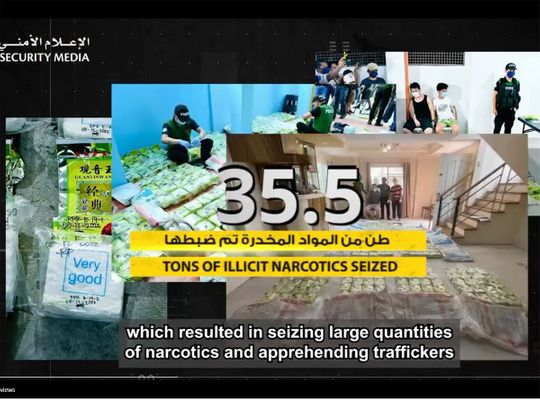
Abu Dhabi: The UAE has actively participated in an international drug trafficking operation that successfully seized illegal drugs and substances worth $717 million (Dh2.64 billion).
Operation Lionfish V, which was led by the International Criminal Police Organisation (Interpol), also resulted in the arrest of 1,333 suspects in various countries.
The UAE Ministry of Interior (MOI) actively participated in the operation, and hosted coordination meetings to build capacity, as part of a joint international action that enhances international coordination in combating crime, the MOI announced on Thursday (September 22).
“The MOI is keen on supporting international cooperation to combat narcotics. We have done so through our participation in Operation Lionfish V, the operation which was launched by the Interpol Secretariat General to combat cross-border drug trafficking,” Brigadier Abdul Rahman Al Owais, deputy director general of federal drug control at the MOI.
“The UAE has provided several statements and confidential information about couriers and drug traffickerswhich resulted in seizing large quantities of narcotics, and apprehending traffickers. We are keen to continue with this operation and support international cooperation to combat narcotics,” he added.
“Throughout the past five years, we have participated and finances several global operations, including Operation Lionfish which started in Singapore, and is conducted in its fifth edition now in the UAE. We worked on two levels — prevention and seizures. Our global narcotics seizure value has reached over half a billion US dollars,” added Major Hamad Yousef Khater Alhammadi.
Operation Lionfish V
Operation Lionfish V ran from June 23 to July 31, 2022, and targeted drug trafficking along air, land and sea routes in 22 countries. It involved cross-border efforts from multiple authorities, and allowed for the seizure of 291 chemical substances and 35.5 tons of narcotics.
Conventional drugs such as cocaine and cannabis still account for the largest share of the illicit drug market, however Operation Lionfish V confirmed the high production and sale of synthetic drugs, such as methamphetamine, Captagon and ketamine, that are made from chemical precursors.
Once the chemical precursors are obtained, criminal organisations can produce endless amounts of synthetic drug supply at a very high profit margin. This is especially possible because the production of synthetic drugs does not depend on environmental or external factors, as in the case of cocaine and heroin production, but can be manufactured in urban areas close to transportation centers.
Operational results
During the five-week operation, authorities seized 1.8 tons of ketamine, 683 kilograms of methamphetamine and 581 kilograms of Captagon. The large seizures included 20.2 tons of cocaine, 11.7 tons of hashish, 158 kilograms of heroin, 651,000 tablets, 48 kilograms of tramadol, 9.5 million tablets of pseudoephedrine used in the manufacture of methamphetamine, and dozens of firearms, missiles and explosives.
A huge secret laboratory capable of producing thousands of kilograms of ketamine was dismantled in Cambodia, where police arrested an internationally wanted person under an Interpol Red Notice for cross-border drug smuggling.
India made the largest single seizure of heroin during the operation, confiscating 75.3 kilograms of heroin in Mundra port. The operation proved that drug traffickers used different types of transportation for drug smuggling, including sea shipments in containers, air mail, postal and courier services, commercial vehicles, ships, and small aircraft.
Counter-drug operation
“Operation Lionfish is a counter-drug operation that we conduct with several countries. We do it regionally, so in this case, we are working with countries from North Africa, Middle East as well as Asia, through leveraging intelligence coming from source countries such as Colombia, Nigeria and Brazil as well,” said David Caunter, organised and emerging crime directorate at the Interpol’s Drugs Unit.
During the operation, Interpol’s Criminal and Narcotics Networks Unit coordinated a series of round-the-clock operational meetings on the exchange of information through Interpol’s secure global communications channel between participating countries around the clock.
Interpol also succeeded in publishing its Relief database during the operation, which is a forensic tool capable of linking drug seizures worldwide, and through which it was found that there was a positive match between two previous drug seizures in Brazil and Germany.
Active Emirati participation
The pre-operation and capacity-building meetings in Abu Dhabi demonstrated the effectiveness of bringing together law enforcement experts, and the effectiveness of international law enforcement to work together in sharing intelligence directly, to disrupt global drug routes and cut off criminal organisation.
The MOI stressed the importance of international action and cross-border coordination is key to confronting and combating crime in all its forms, especially those related to drug smuggling gangs and promoters who pose an international and cross-border threat. The authority also stressed the effectiveness of international work and coordination, and the its own keenness to provide all forms of support and assistance for such international operations
Cooperation to tackle complex crime
MOI officials said that the complex nature of criminal organisations today requires a careful and coordinated response from law enforcement agencies. Fortunately, the UAE has been able to take advantage of its strategic location at the crossroads of Europe, Asia and the Americas to bring together international drug law enforcement experts, and disrupt criminal activities that know no borders.
“The success of Operation Lionfish V also sends a clear message to international criminal groups that successful cooperation between international law enforcement agencies is both possible and feasible. From this standpoint, the MOI affirms its commitment to support its partners in Interpol to deepen this cooperation in the coming years,” the MOI said.
Operation Lionfish V was implemented under the umbrella of the AMEAP (Africa, Middle East, and Asia-Pacific) project, a multi-year project targeting drug trafficking under Interpol’s Projects for a Safer World.










